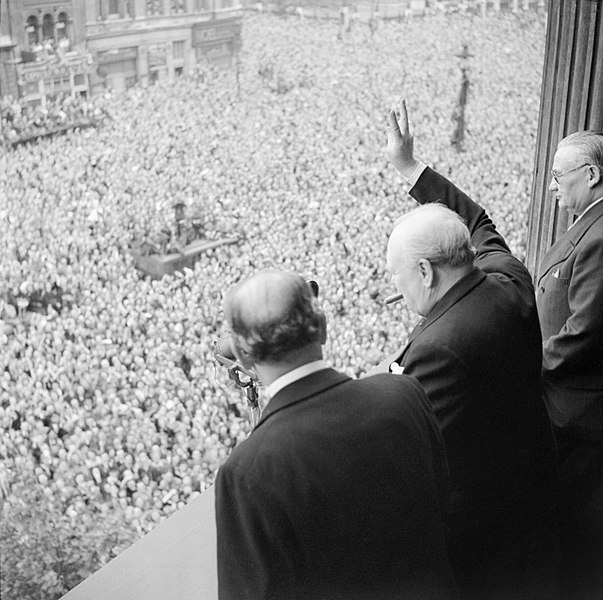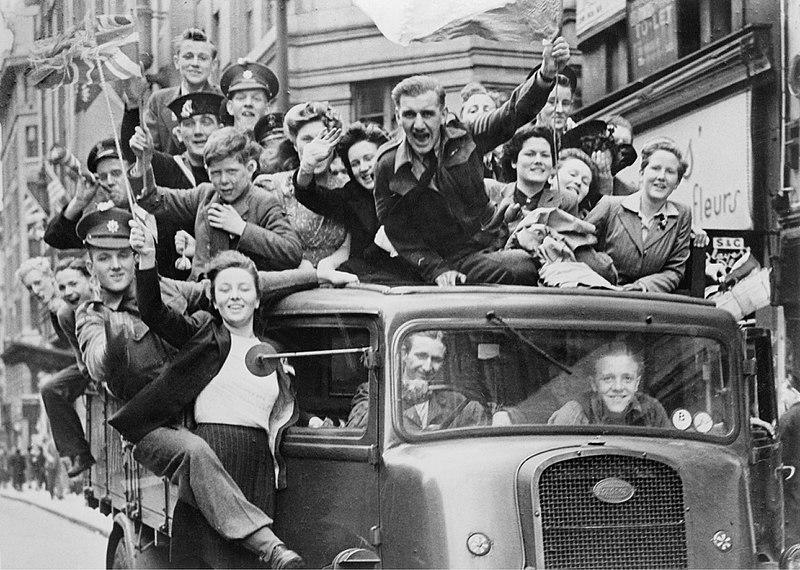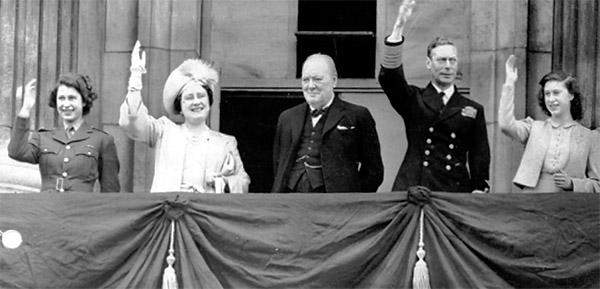
This morning I was teaching a student in Hsinchu, Taiwan, who is taking U.S. history in high school this year. I told her, history is much more than just memorizing dates. However, there is one year I told her she should memorize: 1945. The world changed radically that year, in ways that still affect us today.
- On April 12, 1945, U.S. President Franklin Roosevelt died. As a friend and colleague of mine, Mr. Flanagan, used to tell his students: “I think FDR died as a war casualty.” (This was because, after all the strain of being president for twelve years, including the Great Depression, the burden of being president during World War II helped kill the man.) Meanwhile in Germany, Hitler was delusional when he heard that Roosevelt had died. He was rejoicing, thinking that somehow the Americans would now quit the war. Fat chance. U.S. Vice President Harry Truman, a political lightweight compared to FDR, was thrust into the presidency.
- On April 30, in Berlin, Hitler had stopped rejoicing and instead committed suicide, because he could hear the pounding of Russian tanks just blocks away from his bunker. His dreams for a 1,000 Year “Reich” were crumbling after just twelve years.
- On May 8, the broken remnants of the German government surrendered to the Allies, thus ending World War II in Europe. So, May 8 is known as VE Day (Victory in Europe Day). However, Japan was still fighting in the Asia/Pacific region, unwilling to surrender.
- On August 6, on President Truman’s orders, the U.S. B-29 Superfortress Enola Gay dropped the first atomic bomb used in combat on the Japanese city of Hiroshima. Even today, the world lives under the shadow of nuclear war. This new threat–nuclear weapons–entered the world in 1945.
- Just three days later, on August 9, the U.S. dropped a second atomic bomb on the Japanese city of Nagasaki. These two bombings forced the Japanese government to surrender, thus ending the horrors of World War II.
- On August 15, (August 14th in the USA), the Emperor of Japan announced that Japan would finally surrender, so these two dates are called VJ Day (Victory over Japan Day).
- On September 2, Japan formally signed the surrender documents aboard the USS Missouri, in Tokyo Bay, Japan, so that date is sometimes called VJ Day too. To learn more about that surrender, the USS Missouri, and the Dreyer family visit to that ship, read Scott’s blog about Pearl Harbor.
As you can see, 1945 was a famous year, a turning point in world history.
But for today, let’s focus on VE Day, May 8.
Whenever you study history, you have to look at it from the context of that time, not from today’s viewpoint. World War II had begun six years earlier, when Nazi Germany invaded Poland on September 1, 1939. (Some would claim that WW II actually began several years before that, when Japan invaded China.) Either way, the war had engulfed much of the globe in conflict, and had killed millions. The Nazi Holocaust had killed some 6 million Jews alone, and the Nazi invasion of the USSR had killed some 20 million more. By any measure, the devastation was horrific.
So, by April 30, 1945, when Hitler killed himself and left a shattered Germany in the hands of his Nazi officers, it was clear Germany had to surrender. The Soviet Red Army was in the German capital of Berlin, while the American forces under Eisenhower were liberating Europe from the West. After Hitler’s death, Nazi command fell to Grand Admiral Karl Dönitz, who quickly arranged a surrender to Supreme Allied Commander Eisenhower, at his headquarters in France, on May 7. Late that day, word reached the BBC, which then broadcasted news of the victory to England and the British Empire, and soon the whole world knew. The BBC announced that the next day, May 8, would be a national holiday, Victory in Europe Day. However, with the wonderful news, spontaneous celebrations broke out across the UK and around the world, from London to Los Angeles to New Zealand. London’s famous Saint Paul’s cathedral held ten consecutive church services, to offer thanks to God for a victorious end to WW II. (The photo at right shows crowds celebrating in London on May 8, 1945.)

At 3:00 pm on VE Day, British Prime Minister Winston Churchill addressed the nation by radio; as the wartime leader since the black days when he took office in May 1940, Churchill was the man of the hour and his people wanted to hear from him.
The royal family appeared on the balcony of Buckingham Palace eight times that day to greet the cheering crowds: it was King George VI (the subject of the movie, The King’s Speech), his wife, and their daughters Princess Elizabeth (now Queen Elizabeth II) and Princess Margaret. At one point, Churchill joined them on the balcony (see photo below). During the royal family’s last appearance that evening, their two princess daughters were allowed to leave the palace and mingle anonymously among the celebrating crowd.

Despite the jubilation, there was still seriousness. Japan was still at war, and with their fanatical resistance, their defeat seemed far off and uncertain. Plus, the US was still in mourning, where the new president Truman had ordered flags to be flown at half-staff for 30 days to honor FDR. Still, VE Day marked the surrender of Nazi Germany, the end of hostilities in Europe, the end of the killing and carnage there, and the restoration of peace in Europe that has largely continued to this day!
VE Day was a day to celebrate in 1945, and a day for us all to remember for all time. We all owe the World War II generation a great debt of gratitude. No wonder they are called “The Greatest Generation.”
********************************
Learn more about VE Day here, from the British Imperial War Museum, a rich resource I used as a source for this post.
Want to know more about Churchill, “the man of the hour” on VE Day? Check out Scott’s Churchill I and Churchill II podcasts!
With DreyerCoaching.com classes, you not only learn English, but also some of the history and culture of the English-speaking world. Contact us today to find out how we can help you!
